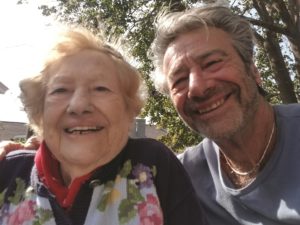PROVINCETOWN — Bernice Burchman is 92 and has Stage 4 lung cancer, and yet her son Howard said his mom has been thriving ever since he took her out of a nursing home and brought her home to Center Street.
Bernice was living at Maplewood, an assisted-living residence in Brewster, where, for a few years, she enjoyed a studio apartment, prepared meals in the dining room, and visits from her sons.
Those visits ended when the pandemic began, of course, and about three weeks into the shutdown, Howard received a phone call, he said, from Maplewood saying that his mother, a genial “Jewish girl from the Bronx” who has lived with neurological difficulties resulting from heart surgery, had shortness of breath.
They took her to Cape Cod Hospital, where she was observed and tested for Covid-19 before being sent days later to Liberty Commons in Chatham with a diagnosis: Stage 4 lung cancer.
Following the isolation protocols to prevent Covid-19 infection, Bernice was quarantined in a room for 14 days, but even after that family and friends were still banned from visiting.
Every time Howard or his brother called, they were told Bernice was asleep.
“The nursing home started to put pressure on me to decide if she should be put into hospice,” Howard said. “But how could I make that decision when I couldn’t even see her?”

Howard thinks that, because the nursing home staff classified her as a fall risk and reasoned she would most likely fall getting up to use the bathroom, they drugged her. He said he knows they put in a Foley catheter to drain urine from her bladder. Bernice has never before or since had urinary incontinence, he added, and has never, except for those days at Liberty Commons, slept for long stretches in the day.
Bill Bogdanovich, president and CEO of Liberty Commons’s parent company, Broad Reach Healthcare, said he couldn’t comment on an individual case, but denied that sedating and catheterizing fall-risk patients is done at the nursing home.
Appalled, Howard feared that his mother could die alone of pneumonia from lack of movement or a urinary tract infection resulting from the Foley catheter. A 2018 University of Michigan study found that more than half of catheterized hospital patients suffered complications, including urinary infections.
“I had to get her out,” Howard said.
It was not an easy decision, given Bernice’s fragile health and Howard’s lack of medical experience. But he moved her to his guest house, the Tucker Inn, where she could at least die with her loved ones around her.
“I was scared to death,” Howard said.
With the help of Visiting Nurse Association hospice workers, and of Michelle Smith and Lila Busa, the inn’s devoted live-in staff, who had time on their hands because the guest house was closed, Bernice thrived.
“She is restored to life — that’s the only expression I can use,” said Howard.
The Burchmans are lucky. Covid-19 has killed elderly people at high rates, especially those in nursing homes. “People in long-term care facilities make up 8 percent of coronavirus cases, but 45 percent of all Covid-19 deaths,” the Kaiser Family Foundation reported last month.
The pandemic has also increased elders’ isolation and ripped away an already skimpy safety net.
“One of things that has happened is that a lot of the support systems that were in place, like adult day-care programs, councils on aging, volunteer organizations like Nauset Neighbors that help out with rides, have all been shuttered,” said Melanie Braverman, co-founder of the Alzheimer’s Family Support Center, which helps families navigate the challenges of dementia.
The nonprofit’s support groups for caregivers, formerly held in local senior centers or long-term care facilities, are now all online. Currently there are 20 such groups, Braverman said.
It’s been a challenge to help family members learn to use Zoom and the necessary electronic devices. And it’s still not enough.
“Isolation is one of the worst symptoms of this disease,” Braverman said. “We are seeing people declining a lot faster.”
Even before Covid-19, the demands on caregivers were tremendous. Among elderly couples, “co-morbidity” is very high, because the caregivers wear out watching over the spouse who is worse off, Braverman said.
Linda Groth of Eastham has been caring for her 93-year-old mother, Erika Groth, who has Alzheimer’s disease, for 12 years. During 10 of them, she took her mom to the Eastham Senior Center’s adult day care. For three days a week, from 8:30 a.m. to 2 p.m., her mother had someone to look after her, with music, visits from pets, and other programs. The pandemic canceled adult day care all across the Cape, Braverman said, “and we don’t know if they are coming back. We don’t know what services are going to look like after this.”
Linda, who is 62, said she and her mom walked out of the senior center on March 13.
“Friday the 13th, and we’ve never gone back,” said Linda. “We miss it. We had a routine; it was like a family.”
These days, Linda goes for quick bike rides to get exercise but cannot leave her mom alone for more than 30 minutes.
“Tomorrow, a woman who works at the senior center is going to help me, because I have to get a tooth pulled,” she said. “That’s my excitement for tomorrow. It’s hard. But it’s worth it, and I’d do it again if I had the choice. She took care of me.”
A disease like Alzheimer’s can go on for 20 years, so “you’re not figuring out how to die, but how to live with it, and that’s the hard part, because we are not set up as a culture to help people do that,” Braverman said. “When something like this happens, you really see where the weak links in the culture are, and how the system is not set up to be able to manage public health in a direct way.”



